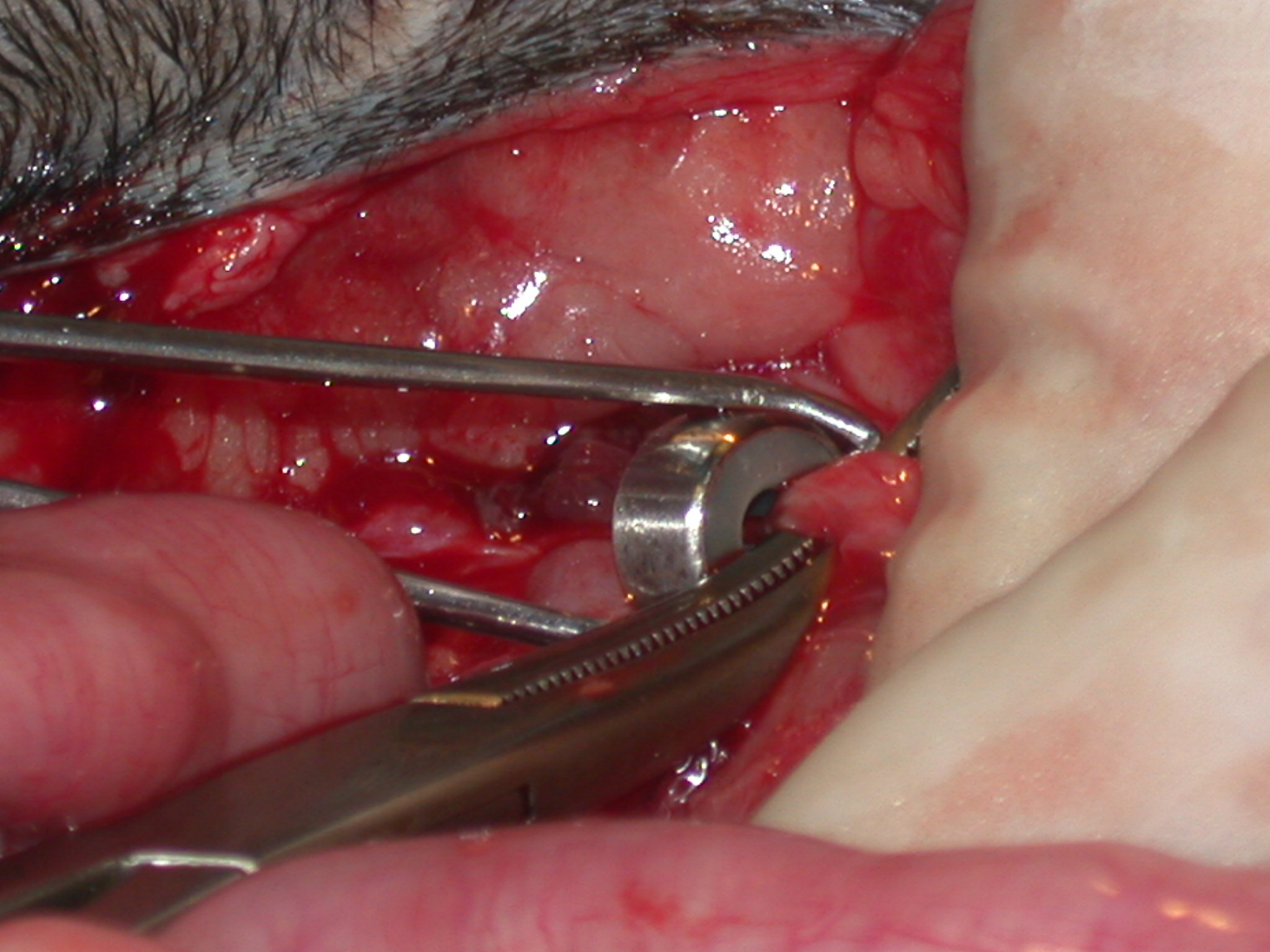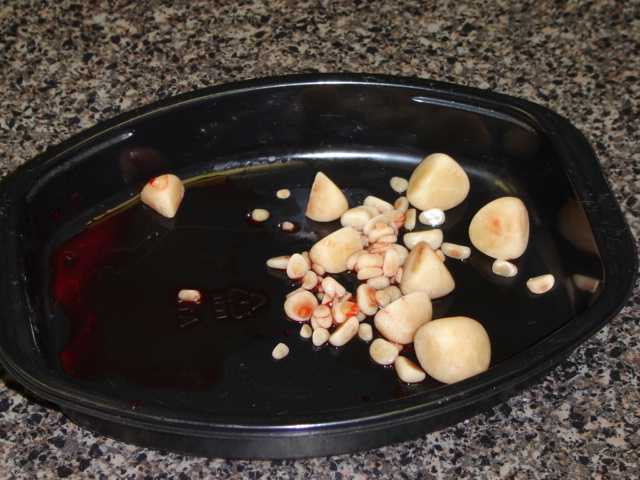|
Health Concerns
|
|
|
If a breeder tells you they've never had any health concerns - or can not explain any/all of the conditions below do NOT buy a puppy from them!!
Mycobacterium Avium Infection Mycobacterium Avium Infection Article 1 Mycobacterium Avium Infection Article 2
Portal Systemic Shunts (hepatic or liver shunt) A portosystemic shunt, is a congenital defect where an abnormal vessel allows blood to bypass the liver. As a result the blood is not cleansed by one of the bodies filters: the liver. Surgical correction is costly and has an 85% success rate. The following picture was taken from a successful repair of a shunt in a schnauzer/poodle cross.
C.J.C. or Congenital Juvenile Cataracts Cataracts are present at birth and progress to cause blindness. Surgery is available but costly. Today this defect is extremely rare among dogs from show lines. Progressive Retinal Atrophy - P.R.A. This causes the retina of the eye to deteriorate slowly. Symptoms may not show until the dog is three to seven years old, beginning with night blindness. P.R.A. eventually blinds the dog. It is incurable. An Electroretinograph can be used for early detection, but this tool is not available to most breeders. Annual eye certification of breeding stock is a must if breeders are to reduce the risk. Urinary Tract Infections - Urolithiasis This seems to occur at a higher rate in Miniature Schnauzers than other breeds. Clinical signs include frequent urination and blood may be present in the urine. Untreated, they can lead to bladder stones. If severe enough this may cause urinary blockage, which is a medical emergency. This problem can occur in dogs for reasons unrelated to heredity. Treatment involves prescription diets, antibiotics and/or surgery. The following picture were stones that developed in the bladder of a four year old mini schnauzer with untreated UTI. A final large stone formed in her kidney, requiring the removal of the kidney.
Pancreatitis This occurs with increasing frequency in Miniature Schnauzers. The exact mechanism is poorly understood, but appears to be associated with the fact that many Miniature Schnauzers have high blood serum lipids (fats). Clinical signs generally include vomiting and diarrhea, abdominal pain, lethargy and depression. It is an emergency situation which warrants immediate veterinary care. Treatment includes intravenous fluids, antibiotics and dietary control. The dog will probably have to be on a low fat diet for the rest of his/her life. Cushing's Disease Cushings is also encountered with some frequency. Females are more affected than males and often fall within the six to eight year age group. Initial clinical signs are increased thirst and urination and an increase in body weight. Later observable is a change in body type, a pot bellied appearance, thinning of the dog's coat and other changes involving the skin. Sudden blindness is also associated with this (SARD). All of this is related to over production of adrenal cortex hormones. Various medications are available to counteract this over production. Hypothyroidism This is the number one inherited disease of dogs in general. The metabolism is affected, causing depression, weight gain, hair loss, lethargy and an intolerance to cold. Untreated, it can lead to immune system, cardiovascular, and reproductive problems. Testing and treatment is relatively easy and inexpensive. Daily medication can give good results and many dogs live healthy lives. Von Willebrand Disease - V.W.D. VWD prolongs blood clotting and can cause complications during surgery, whelping etc. Many dogs who are positive for this live long and healthy lives without ever having any problems with this at all, but it would be a large concern for breeding females. Schnauzer Bumps aka comedone These bumps are blackheads or pimples on their back. This can be related to allergies, metabolic disorders, or genetics. This is not a real serious problem (not at all life-treatening). Some Schnauzers will develop one or two of these during a lifetime, others get them much more frequently. Sebaceous Cysts Generally harmless with a fatty, white, semi-solid material called sebum. Unless they become uncomfortably large, or burst and become infected most cysts do not require treatment. It is often possible to simply lance or 'squeeze' the cysts, although we recommend you consult with a vet or your breeder! Dental concerns Schnauzers may need routine professional dental cleanings, or you can try to keep a regular schedule of brushing his/her teeth to help prevent dental problems. Autoimmunity In a great number of cases, the onset follows a recent vaccination, therapeutic or preventative drug use, infection, toxic exposure, hormonal change/imbalance, or stress event. The evidence implicating vaccines as triggering agents in genetically susceptible dogs is growing. The Miniature Schnauzer is one of the identified breeds at risk. The onset of adverse reactions to conventional vaccinations (or other inciting drugs or agents) can be an immediate hypersensitivity or anaphylactic reaction, or can occur acutely (24-48 hours afterwards), or later on (10-30 days) in a delayed type immune response usually caused by immune-complex formation. Typical signs of adverse immune reactions include fever, stiffness, sore joints and abdominal tenderness, susceptibility to infections, central and peripheral nervous system disorders or inflammation, collapse with autoagglutinated red blood cells and jaundice, or generalized pinpoint hemorrhages or bruises. Liver enzymes may be markedly elevated, and liver or kidney failure may accompany bone marrow suppression. Furthermore, recent vaccination of genetically susceptible breeds has been associated with transient seizures in puppies and adult dogs, as well as a variety of autoimmune diseases including those affecting the blood [red blood cells (AIIIA) and/or platelets (ITP)], endocrine tissues (autoimmune thyroiditis, Addison's disease), joints (rheumatoid arhritis), skin and mucosa ~emphigus), eyes (pannus, uveitis, KCS), muscles (eosinophilic myositis, myasthenia gravis), liver (chronic active hepatitis), kidneys (immune-complex glomerulonephritis), bowel (inflammatory bowel disease complex), and multiple tissues (systemic lupus erythematosus). |
| Last Updated ( Wednesday, 06 July 2011 17:54 ) |

